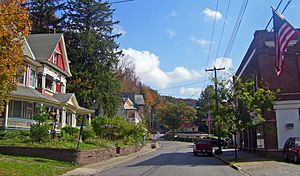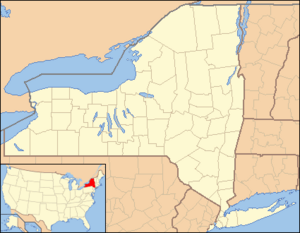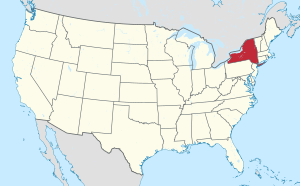Fleischmanns, New York facts for kids
Quick facts for kids
Fleischmanns
Griffin Corners
|
|
|---|---|

Main Street and Halcott Road downtown
|
|
| Etymology: Derived from Charles Louis Fleischmann | |

Location of Fleischmanns within New York
|
|

Location of New York in the United States
|
|
| Country | United States |
| State | New York |
| County | Delaware |
| Named for | Charles Louis Fleischmann |
| Government | |
| • Type | Skene Memorial Library |
| Area | |
| • Total | 0.67 sq mi (1.73 km2) |
| • Land | 0.66 sq mi (1.70 km2) |
| • Water | 0.01 sq mi (0.04 km2) |
| Elevation | 1,520 ft (460 m) |
| Highest elevation
(S corner of town on Belleayre Mountain)
|
1,940 ft (590 m) |
| Lowest elevation
(Bush Kill on W village line)
|
1,480 ft (450 m) |
| Population
(2020)
|
|
| • Total | 210 |
| • Density | 320.61/sq mi (123.79/km2) |
| Time zone | UTC-5 (Eastern (EST)) |
| • Summer (DST) | UTC-4 (EDT) |
| ZIP Code |
12430
|
| Area code(s) | 845 |
| FIPS code | 36-26209 |
| GNIS feature ID | 0950271 |
| Wikimedia Commons | category |
| Official Newspaper: The Mountain Eagle | |
Fleischmanns is a small village in Delaware County, New York, United States. It is part of the town of Middletown. The village is named after Charles Louis Fleischmann, a famous businessman from Hungary. In 2020, the population was 210 people.
Contents
History of Fleischmanns
Early Settlers and Travel
Long ago, people who settled in this area came from countries like Germany, England, the Netherlands, and Ireland. They traveled by horse and wagon over rough roads. Later, stagecoaches also used these paths. The journey was difficult, especially in winter, until a railroad line reached the village on May 23, 1870. This made travel much easier.
How Fleischmanns Got Its Name
Fleischmanns was first called Griffin Corners. It was named after Matthew Griffin, a well-known lawyer and businessman. He owned a store and a hotel, and he helped set up the village's first post office in 1848. Matthew Griffin passed away on January 11, 1903.
The area became part of Delaware County on March 3, 1789. Back then, a few rich people owned huge amounts of land. Farmers rented this land from them. After a time of protests by farmers (called the Anti-Rent War in 1844-1845), new rules were made. These rules ended the unfair renting system, and people could start to own their own land.
The Fleischmann Family's Influence
In 1883, Charles Louis Fleischmann bought land near the railroad station. Charles Fleischmann was born near Budapest, Hungary. He was famous for his company that made yeast and whiskey. The person who sold him the land knew that a summer community would bring money to the village.
Soon, wealthy families built beautiful summer homes in Fleischmanns. These homes had many porches, towers, and terraces. They were very expensive for that time, costing $30,000-$40,000. The Fleischmann family also built a deer park, a riding stable, a heated pool, and a trout pond. These were considered great luxuries. The family even bought uniforms for the local band to greet their private train cars at the station.
From 1890 to 1912, the community had two names. The eastern part was Griffin Corners, and the western part was Fleischmann (without the "s"). When the village officially became a town in 1913, it was named Fleischmanns.
Fleischmanns Park and Baseball
Fleischmanns Park was given to the village in May 1914 by Julius Fleischmann, Charles's son. The Fleischmann family loved baseball. Their baseball team, the Mountain Athletic Club, used the park to get ready for their season. A famous player named Honus Wagner, also known as the Flying Dutchman, played there. He was later put into the Baseball Hall of Fame in 1936.
The park was given with special rules: it must always be used as a park and sports field, kept in good condition, never sold, and always open to the public for free. However, in 1934, the village was allowed to charge a small fee for some events.
Growth and Famous Residents
During this time, Fleischmanns grew a lot. Many rich and famous people built summer homes here. Some of them included Herbert Lehman, who was the Governor of New York, and the Leibman family, who owned a brewery. Famous musicians like Anton Seidl (a conductor) and Amelita Galli-Curci (a singer) also had homes nearby. The actress and producer Gertrude Berg also lived in Fleischmanns.
Lake Switzerland
Lake Switzerland, just north of the village, was built for boating and swimming in the summer. In winter, people would harvest ice from it. Construction started in 1906 using horses and oxen. The lake officially opened a year later. After some repairs, the dam was lowered by four feet to make it safer for the townspeople.
Skene Memorial Library
The Skene Memorial Library on Main Street was started by a famous surgeon, Alexander Skene, and his wife. They spent their summers in the area. Thanks to Mrs. Skene, a large donation of $5,000 was given by Andrew Carnegie, which helped build the free public library. The first stone was laid in November 1901. There are also two war memorials in front of the library, honoring those who served in World War I, World War II, Korea, and Vietnam.
Schools in Fleischmanns
Before 1909, there was only a one-room schoolhouse. As more children enrolled, more rooms were added, and eventually, Griffin-Fleischmanns High School was built. Its name changed to Fleischmanns High in 1928. After combining with Margaretville schools in 1968, grades 1-4 stayed in the Fleischmanns building. However, because fewer students were enrolling, the school closed in June 1984. The building was later bought by a local businessman and turned into apartments. The school's gymnasium is still used for concerts and public events today.
Summer Resort Village
Fleischmanns became a popular summer vacation spot in the late 1800s. People came for the mountains, fresh air, and spring water. Many homes and hotels were built or made bigger to welcome more visitors. It is said that in the 1940s, the village had about 500 permanent residents, but by the Fourth of July, there could be 10,000 people in town! While many old hotels are gone, Fleischmanns is becoming popular again. People are fixing up old homes and building new ones.
Fleischmanns in Movies
Several movies have been filmed in Fleischmanns.
- Julian Po, a 1997 movie starring Christian Slater, was filmed here.
- The Dead Don't Die, a 2019 movie with stars like Bill Murray and Selena Gomez, was also filmed in Fleischmanns. In the movie, Fleischmanns was called the fictional town of Centerville.
Geography
Fleischmanns is located on the north side of NY 28. It is a short distance west of the Ulster County border. The village has a total area of about 0.7 square miles (1.73 square kilometers). Most of this area is land, with a small amount of water.
Population Changes
| Historical population | |||
|---|---|---|---|
| Census | Pop. | %± | |
| 1920 | 525 | — | |
| 1930 | 495 | −5.7% | |
| 1940 | 546 | 10.3% | |
| 1950 | 469 | −14.1% | |
| 1960 | 450 | −4.1% | |
| 1970 | 434 | −3.6% | |
| 1980 | 346 | −20.3% | |
| 1990 | 351 | 1.4% | |
| 2000 | 351 | 0.0% | |
| 2010 | 351 | 0.0% | |
| 2020 | 210 | −40.2% | |
| U.S. Decennial Census | |||
In 2010, there were 351 people living in Fleischmanns. About 27% of the households had children under 18. The average household had about 2.56 people. The median age in the village was 35.7 years old.
Places of Worship
- Congregation B'nai Israel Synagogue
- Spinka Synagogue
- Fleischmanns Community Church (United Methodist)
- Cornerstone Bible Baptist Church
- USA Shaolin Temple
Historic Places
Several buildings in Fleischmanns are listed on the National Register of Historic Places. This means they are important historical sites. These include:
- The Amelita Galli-Curci Estate
- The Congregation Bnai Israel Synagogue
- The Maxbilt Theatre
- The Skene Memorial Library
See also
 In Spanish: Fleischmanns para niños
In Spanish: Fleischmanns para niños
 | John T. Biggers |
 | Thomas Blackshear |
 | Mark Bradford |
 | Beverly Buchanan |

